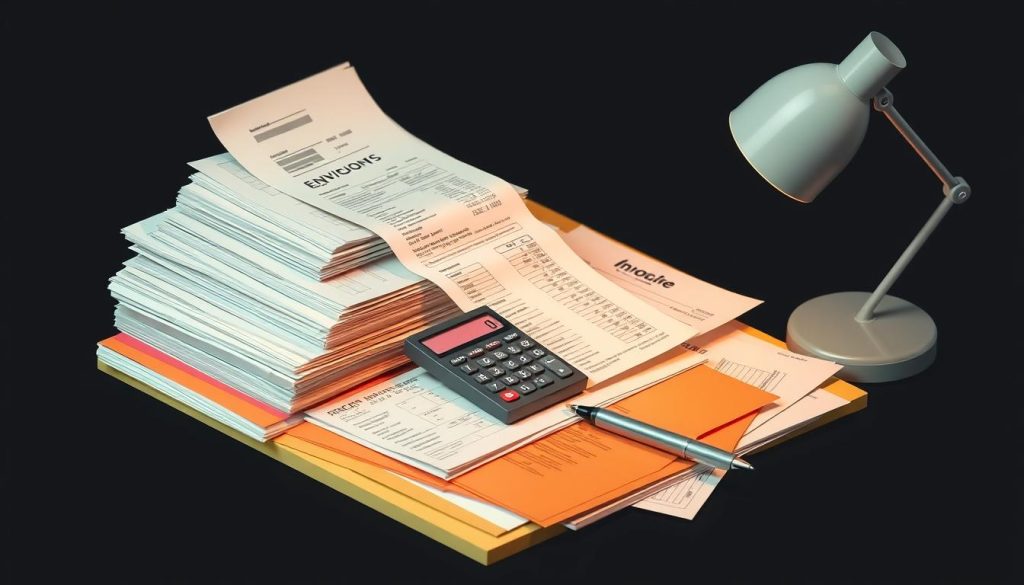As a freelancer, knowing your tax deductions can cut down your taxes. The self-employment tax rate is 15.3%, covering Social Security and Medicare. You can learn more about freelancer tax deductions on websites like freelancer tax deductions. This helps you keep more of your earnings.
Freelancers can deduct many expenses, like home office costs and self-employment taxes. These deductions can be a big part of your income. The IRS says 36% of U.S. workers freelance. With the right knowledge, you can use all the tax breaks for freelancers.
Knowing which expenses you can deduct helps freelancers lower their taxes. This guide will cover the top deductions for freelancers. You’ll learn about home office deductions, equipment and supplies, and more.
Table of Contents
Key Takeaways
- Freelancers can deduct home office expenses, including a portion of housing expenses, if the space is used solely for business purposes.
- Equipment and supplies necessary for work can be deducted, as long as they are used exclusively for business.
- Freelancers must report income using Form 1040 Schedule C and may be required to pay estimated taxes if they expect to owe more than $1,000 in taxes for the year.
- Eligible tax-deductible expenses for freelancers include office expenses, travel, and health insurance for the freelancer, spouse, and dependents.
- Tax-advantaged plans for self-employed workers, such as Solo 401(k) and SEP IRA, can reduce taxable income and allow for tax-deferred growth.
- Freelancers can deduct costs of necessary education and training, as long as they are directly related to improving business skills or knowledge.
- Business meals can typically be deducted at a rate of 50%, and client meals, entertainment, and gifts may also be eligible for deduction.
Understanding Freelancer Tax Deductions
As a freelancer, knowing about tax deductions is key. These are expenses you can subtract from your income, lowering your taxes. Freelancers can deduct things like home office costs, equipment, and supplies. This can lead to big tax savings.
The IRS lets self-employed folks deduct business expenses from their income. For instance, you can deduct 67 cents for each mile driven for work. You can also deduct health insurance for yourself and your family. To get a home office deduction, your home must be your main work place.
Other things freelancers can deduct include:
- Business meals, but only if they’re not personal
- Interest on business credit cards, reported on Form 1040
- Work-related education costs, like courses and books
- Payroll expenses, including taxes and real estate taxes
For more details on freelancer tax deductions, check out Sofi’s guide or Simulateur Portage Salarial’s blog. By understanding and using these deductions, freelancers can keep more of their earnings.
Common Deductible Expenses for Freelancers

As a freelancer, knowing what expenses you can deduct is key. These deductions can lower your taxes, helping your finances. A big one is the home office deduction. It lets you deduct part of your rent or mortgage and utilities as business costs.
Freelancers can also deduct equipment and supplies needed for work. This includes computers, software, and office supplies. It’s important to keep good records of these expenses for your tax return. Other things you can deduct are communication costs, like broadband and cellphone bills, and business insurance.
- Business use of your car, including gas, oil, and maintenance costs
- Travel expenses, such as flights, hotels, and meals
- Professional fees, including accounting and legal services
- Continuing education expenses, such as courses and workshops
By using these deductions, freelancers can lower their taxable income. This helps reduce their taxes. Always talk to a tax expert to make sure you’re using all the deductions you can.
Education and Professional Development Deductions
If you work for yourself, you can get self-employed tax deductions for learning and growing. This includes things like tuition, books, and supplies. These help you keep or get better at your job. The IRS lets you write off these costs as freelance tax write-offs, which can lower what you owe in taxes.
Some things you can deduct include:
- Courses and workshops that improve your skills
- Industry-specific certifications that boost your knowledge
- Travel costs for education, like getting there and staying somewhere
It’s key to save your learning expense records. This includes receipts and any other proof. You can list these on Schedule C or Schedule F (Form 1040), based on how you run your business. Using these freelance tax write-offs helps you stay ahead in your field and meet new challenges.
Deducting Health Insurance Premiums

As a freelancer, you can deduct health insurance premiums as a business expense. This can lead to big tax savings. It’s a key part of freelancer tax planning, helping lower your taxable income and taxes owed.
To get this deduction, you must be self-employed and not have an employer plan. The tax breaks, including health insurance, can be claimed on Schedule 1 of Form 1040. This deduction can be very helpful, as it lowers your adjusted gross income (AGI).
Lower AGI means you’re less likely to hit phase-out rules on other tax breaks. For example, if you make money from your self-employment, you can deduct health insurance premiums. This includes medical, dental, and long-term care insurance.
Here are some key points to consider when deducting health insurance premiums:
- Self-employed individuals can deduct health insurance premiums for themselves, their spouses, and their dependents.
- The deduction cannot exceed the earned income collected from the self-employment activity.
- Deductions for long-term care insurance premiums are limited to certain amounts based on age.
It’s vital to keep accurate records of your health insurance premiums. Also, consult with a tax professional to make sure you’re getting all the tax breaks you can. This way, you can reduce your tax liability and save more money.
| Age | Long-term Care Insurance Premium Deduction |
|---|---|
| 40 and younger | $470 |
| 41 to 50 | $880 |
| 51 to 60 | $1,760 |
| 61 to 70 | $4,710 |
| Over 70 | $5,880 |
Business Structure and Tax Implications

Choosing your business structure as a freelancer is key to your taxes. Knowing the differences between sole proprietorships, LLCs, and others helps you make smart choices. Tax deductions for freelancers change a lot based on your structure, so picking the right one is critical.
Freelancers can deduct business costs like home office, equipment, and supplies. But, the structure you pick affects what you can deduct. Sole proprietorships and single-member LLCs are like pass-throughs. This means you report business income on your personal taxes.
On the other hand, multi-member LLCs and corporations are separate from their owners. They report business income on their own tax returns. This changes what deductions you can get and your tax rates. Knowing this helps freelancers choose wisely and get the most tax deductions for freelancers.
Freelancers should think about these things:
- Deducting business expenses like home office and equipment
- Getting self-employment tax deductions for retirement plans
- Deducting health insurance premiums, including dental and long-term care
By picking the right structure and understanding taxes, freelancers can cut their tax bill. They can also get more self-employed tax deductions.
How to Keep Track of Your Expenses
As a self-employed person, it’s key to track your expenses. This helps you claim deductible expenses for self-employed and save on taxes. Keeping accurate records is vital for freelancers to claim all they can.
Best Practices for Record Keeping
- Use a separate business bank account to avoid mixing up transactions
- Save receipts and invoices for at least 3 years to back up your tax claims
- Have an expense policy to make business expenses easier to track and book
Tools and Software for Expense Tracking
FreshBooks accounting software is great for tracking expenses. It uses a double-entry system to make financial records easier. Linking your financial accounts to the software can also cut down on errors. For more on expense tracking tools, check out this resource.
Navigating IRS Forms for Freelancers
As a freelancer, knowing the IRS forms you need is key. Filing the correct forms lets you use tax breaks like freelancer tax deductions. The IRS has forms like the 1040, Schedule C, and Schedule SE. These are important for showing your business income and expenses.
To get through these forms, you need to know a few things. This includes:
- Business income and expenses
- Self-employment tax
- Qualified Business Income deduction
Key Forms You Need to Know
Schedule C is a must for freelancers. It lets you report your business income and expenses. Accurate completion of this form can lower your taxable income. You also use the 1040 for personal income and Schedule SE for self-employment tax.
How to Fill Out the Forms Correctly
To get the most from tax breaks, fill out the forms right. This means reporting all your business income and expenses. Claiming eligible deductions and paying self-employment tax is also important. With these steps and maybe some professional help, you can handle IRS forms well and get the most from your freelancer tax deductions.
Tax Deductions Specific to Your Industry
As a freelancer, knowing your industry’s tax deductions is key. Write offs for gig workers differ based on your work type. For instance, creatives can deduct costs for equipment and software. Consultants might deduct travel and client entertainment expenses.
Grasping these deductions can boost your tax advantages for freelancers. The IRS lets self-employed folks deduct business costs on their tax returns. This includes home office, equipment, and travel expenses. For more on tax deductions and business help, check out this link.
Some specific deductions include:
- Home office deductions for freelancers who work from home
- Equipment and software deductions for creatives
- Travel and client entertainment deductions for consultants
Creative Professions
Freelancers in creative fields, like writing, design, or photography, can deduct certain costs. These include equipment, software, and travel expenses. These deductions can lower your taxable income and your tax bill.
Consulting and Professional Services
Freelancers in consulting and professional services, such as consulting, coaching, or accounting, have specific deductions. They can deduct travel, client entertainment, and equipment costs. These deductions can save you money on taxes and increase your earnings.
The Importance of Estimated Taxes
As a freelancer, knowing about estimated taxes is key. Self-employed tax deductions and freelance tax write-offs can lower your taxes. The IRS says freelancers must pay estimated taxes if they owe $1,000 or more for the year.
To figure out your payments, guess your income and deductions for the year. Use tax planning tools to help. You can also deduct business expenses like home office and equipment to lower your taxable income.
Here are some key points to consider when making estimated tax payments:
- Estimated tax payments are due quarterly on April 15, June 15, September 15, and January 15.
- You can use Form 1040-ES to make estimated tax payments.
- If you fail to make estimated tax payments, you may be subject to penalties and interest.
Understanding estimated taxes and making timely payments helps avoid penalties. It also ensures you follow tax laws. Always talk to a tax professional if you have questions about self-employed tax deductions and freelance tax write-offs.
| Quarter | Due Date |
|---|---|
| April 15 | First quarter payment |
| June 15 | Second quarter payment |
| September 15 | Third quarter payment |
| January 15 | Fourth quarter payment |
Tips for Maximizing Your Deductions
As a freelancer, it’s key to use all tax breaks you can. Good freelancer tax planning can lower your taxes and increase your deductions. To do this, think about getting help from a tax expert who knows about freelancer taxes.
Consult a Tax Professional
A tax expert can guide you through tough tax laws and find deductions you might miss. They can also help with keeping records and meeting deadlines. This ensures you get the most from your deductions. Some benefits of getting a tax professional include:
- Expert knowledge of tax laws and regulations
- Identification of possible deductions and credits
- Help with keeping records and meeting deadlines
Common Mistakes to Avoid
To get the most from your deductions, avoid common freelancer mistakes. These include not keeping good records, missing deadlines, and not using all eligible deductions. Knowing these mistakes helps you make the most of your tax planning and lower your taxes.
Resources for Freelancers and Tax Deductions
As a freelancer, you have many resources to help with tax deductions. The Internal Revenue Service (IRS) has guides and publications. They explain tax rules for the self-employed. These resources can help you save on taxes.
There are also online tools and calculators for freelancers. They help estimate deductions and ensure accurate tax filings. These tools keep you organized and help avoid common mistakes.
FAQ
What are tax deductions for freelancers?
Tax deductions are expenses that freelancers can subtract from their income. This reduces the income tax they owe. Knowing what expenses are deductible is key for freelancers to save on taxes.
Why are deductions important for freelancers?
Deductions help freelancers offset business costs. This way, they don’t overpay taxes. Deductions can include home office costs, equipment, and professional development.
What are some common deductible expenses for freelancers?
Freelancers can deduct home office costs, equipment, and supplies. The home office deduction is very valuable. It lets freelancers deduct parts of their rent or mortgage and utilities as business expenses.
Can freelancers deduct expenses for education and professional development?
Yes, freelancers can deduct education and professional development costs. This includes tuition, fees, and related expenses like travel and materials.
Can freelancers deduct their health insurance premiums?
Yes, freelancers can deduct health insurance premiums as a business expense. This can save a lot on taxes. Freelancers must meet certain criteria to qualify.
How does a freelancer’s business structure affect their tax deductions?
The business structure affects tax deductions and liabilities. Knowing the differences between sole proprietorships, LLCs, and other structures helps freelancers make informed decisions. This maximizes deductions.
What are some best practices for keeping track of freelancer expenses?
Accurate expense records are essential for freelancers. They should use a separate business bank account and save receipts. Tools and software for tracking expenses are also helpful.
What IRS forms do freelancers need to file?
Freelancers need to understand IRS forms for compliance. Key forms include the 1040, Schedule C, and Schedule SE. Knowing how to fill them out correctly is important.
Are there any industry-specific deductions that freelancers should be aware of?
Yes, different industries have unique deductible expenses. For example, creatives can deduct equipment and software costs. Consultants can deduct travel and client entertainment expenses.
What are estimated taxes, and how do they affect freelancers?
Freelancers must make estimated tax payments each quarter to the IRS. This is because they don’t have taxes withheld like employees do. Understanding estimated taxes and how to calculate payments is key to avoid penalties.
What are some tips for maximizing freelancer tax deductions?
Freelancers should consult a tax professional familiar with freelancer taxation. Being aware of common mistakes, like poor record-keeping, can also help maximize deductions.
What resources are available for freelancers to learn about tax deductions?
Freelancers can find many resources on tax deductions. The IRS offers guides and forms that explain deduction rules. Online tools and calculators can also help estimate deductions and ensure accuracy when filing taxes.
Source Links
- A Freelancer’s Guide to Taxes – https://turbotax.intuit.com/tax-tips/self-employment-taxes/a-freelancers-guide-to-taxes/L6ACNfKVW
- The freelancer’s guide to taxes | How to do taxes as a freelancer – https://www.usbank.com/financialiq/invest-your-money/tax-strategies/the-freelance-taxes-guide.html
- 6 Freelance Tax Deductions & Benefits for the Self-Employed – https://www.freshbooks.com/hub/taxes/what-job-related-expenses-are-tax-deductible?srsltid=AfmBOoqsy8g4VpvhGIE7TPBkpy2cxdt_2Cfx_QJd92y-D6cb8eI7e31U
- Tax Write-Offs For Self-Employed: What You Can Claim – https://www.driversnote.com/small-business-tax-guide-us/tax-deductions-self-employed
- 15 Popular Self-Employment Tax Deductions – NerdWallet – https://www.nerdwallet.com/article/taxes/self-employment-tax-deductions
- Complete List of Freelance Business Expenses – https://www.paulmaplesden.com/freelance-guides/the-complete-list-of-freelance-business-expenses
- Topic no. 513, Work-related education expenses – https://www.irs.gov/taxtopics/tc513
- Continuing Education Tax Deduction Guide – https://www.driversnote.com/blog/continuing-education-tax-deduction
- The Professional Development Tax Deduction: What you Need to Know – https://www.findcourses.com/prof-dev/career-development/professional-development-tax-deduction-11543
- Topic no. 502, Medical and dental expenses – https://www.irs.gov/taxtopics/tc502
- Deducting Health Insurance Premiums If You’re Self-Employed – https://turbotax.intuit.com/tax-tips/home-ownership/deducting-health-insurance-premiums-if-youre-self-employed/L6bRhLaVE
- Instructions for Form 7206 (2024) – https://www.irs.gov/instructions/i7206
- Guides: 17 Self-Employed Tax Deductions for Freelancers and Small Business Owners – https://found.com/resources/common-deductions-for-freelancers
- Can a Freelancer Gain Tax Benefits with an LLC? – NCH – https://nchinc.com/blog/tax-accounting/is-an-llc-necessary-for-freelance-tax-benefits/
- How to Keep Track of Business Expenses in 8 Steps (2025 Guide) – https://www.freshbooks.com/hub/expenses/keeping-track-of-business-expenses?srsltid=AfmBOorLOrV711pz2hJko48D-SAVeoSLXhkTi6S2sF-P9EjrPnvXERvI
- What kind of records should I keep – https://www.irs.gov/businesses/small-businesses-self-employed/what-kind-of-records-should-i-keep
- Publications and forms for the self-employed – https://www.irs.gov/businesses/small-businesses-self-employed/publications-and-forms-for-the-self-employed
- Schedule C Tax Form: A Guide for Freelancers & Owners – https://bluenotary.us/schedule-c-tax-form/
- 20 Tax Deductions for Self-Employed People – https://turbotax.intuit.com/tax-tips/self-employment-taxes/top-tax-write-offs-for-the-self-employed/L7xdDG7JL
- 6 Freelance Tax Deductions & Benefits for the Self-Employed – https://www.freshbooks.com/hub/taxes/what-job-related-expenses-are-tax-deductible?srsltid=AfmBOoo1rvxNz9okYPyENzm7EUUwcBofmjd_A2Xt75Jf5CIFUZWlg35e
- 17 Big Tax Deductions (Write Offs) for Businesses | Bench Accounting – https://www.bench.co/blog/tax-tips/small-business-tax-deductions
- Self-employed individuals tax center | Internal Revenue Service – https://www.irs.gov/businesses/small-businesses-self-employed/self-employed-individuals-tax-center
- Freelancer Taxes: Ultimate Guide for Tax Filling & Smart Savings – https://www.freshbooks.com/hub/taxes/freelancer-taxes?srsltid=AfmBOooCPbU7NdMIzY4yKCBQ6N7Ja5oNUvi8IovFOkRHCERNhtXmxzX3
- Freelancers and Taxes: What to Know Before Tax Season Hits – https://www.myaocu.com/news-and-events/freelancers-and-taxes-what-to-know-before-tax-season-hits
- Freelancer & Self-Employed Worker’s Guide to the Top Deductions for the 2024 Tax Year – https://blog.freelancersunion.org/2025/02/03/freelancer-self-employed-workers-guide-to-the-top-deductions-for-the-2024-tax-year/
- Tax Tips for the Self-Employed – https://www.northstarccu.com/blog/tax-tips-for-the-self-employed
- How to Maximize Your Itemized Tax Deductions – https://turbotax.intuit.com/tax-tips/tax-deductions-and-credits/how-to-maximize-your-itemized-tax-deductions/L1ANcotWP
- Tax Deductions for Freelancers: Claiming Professional Development Expenses | Pollen – https://www.runpollen.com/articles/tax-deductions-for-freelancers–claiming-professional-development-expenses
- Freelancer Taxes: A Guide for Filing With a Side Hustle – NerdWallet – https://www.nerdwallet.com/article/taxes/freelance-taxes





